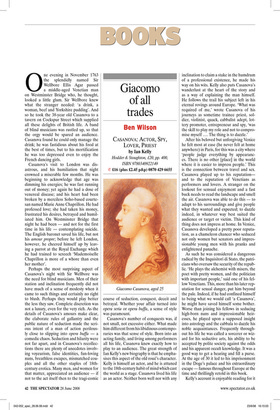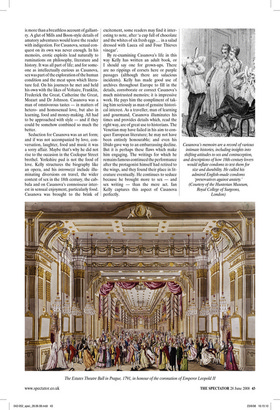Giacomo of all trades
Ben Wilson
CASANOVA: ACTOR, SPY, LOVER, PRIEST by Ian Kelly Hodder & Stoughton, £20, pp. 400, ISBN 9780340922149 ✆ £16 (plus £2.45 p&p) 0870 429 6655 One evening in November 1763 the splendidly named Sir Wellbore Ellis Agar passed a middle-aged Venetian man on Westminster Bridge who, he thought, looked a little glum. Sir Wellbore knew what the stranger needed: ‘a drink, a woman, beef and Yorkshire pudding’. And so he took the 38-year old Casanova to a tavern on Cockspur Street which supplied all these delights of British life. A band of blind musicians was rustled up, so that the orgy would be spared an audience. Casanova found he could only manage the drink; he was fastidious about his food at the best of times, but to his mortification he was too depressed even to enjoy the French dancing girls.
Casanova’s visit to London was disastrous, and his humiliation that night crowned a miserable few months. He was beginning to acknowledge that age was dimming his energies; he was fast running out of money; yet again he had a dose of venereal disease; and his heart had been broken by a merciless Soho-based courtesan named Marie Anne Chaprillon. He had professed love; she had taken his money, frustrated his desires, betrayed and humiliated him. On Westminster Bridge that night he had been — and not for the first time in his life — contemplating suicide. The English baronet saved his life, but not his amour propre; before he left London, however, he cheered himself up by leaving a parrot at the Royal Exchange which he had trained to screech ‘Mademoiselle Chaprillon is more of a whore than even her mother’.
Perhaps the most surprising aspect of Casanova’s night with Sir Wellbore was the need for blind musicians. Men of their station and inclination frequently did not have much of a sense of modesty when it came to such things and certainly no right to blush. Perhaps they would play better the less they saw. Complete discretion was not a luxury, even for the very rich. As the details of Casanova’s amours make clear, the elaborate rules of gallantry and the public nature of seduction made the serious intent of a man of action perilously close to slipping into opera buffa — a comedic chaos. Seduction and hilarity were not far apart, and in Casanova’s recollections there are plenty of anecdotes involving voyeurism, false identities, fun-loving nuns, breathless escapes, mismatched couples and all the other staples of 18thcentury erotica. Many men, and women for that matter, appreciated an audience — if not to the act itself then to the tragi-comic course of seduction, conquest, deceit and betrayal. Whether your affair turned into opera seria or opera buffa, a sense of style was paramount.
Casanova’s number of conquests was, if not small, not excessive either. What made him different from his libidinous contemporaries was that sense of style. Born into an acting family, and living among performers all his life, Casanova knew exactly how to play to an audience. The great strength of Ian Kelly’s new biography is that he emphasises this aspect of the old roué’s character. Kelly is himself an actor, and he is attuned to the 18th-century habit of mind which cast the world as a stage. Casanova lived his life as an actor. Neither born well nor with any inclination to claim a stake in the humdrum of a professional existence, he made his way on his wits. Kelly also puts Casanova’s wanderlust at the heart of the story and as a way of explaining the man himself. He follows the trail his subject left in his eternal rovings around Europe. ‘What was required of me,’ wrote Casanova of his journeys as sometime trainee priest, soldier, violinist, quack, cabbalist adept, lottery promoter, entrepreneur and spy, ‘was the skill to play my role and not to compromise myself .... The thing is to dazzle.’ After his beloved but unforgiving Venice he felt most at ease (he never felt at home anywhere) in Paris, for this was a city where ‘people judge everything by appearances. There is no other [place] in the world where it is easier to impress people.’ This is the connection between travel and sex. Casanova played up to his reputationand to the reputation of Venetians as performers and lovers. A stranger on the lookout for sensual enjoyment and a fast buck needs to read the landscape and smell the air. Casanova was able to do this — to adapt to his surroundings and give people what they wanted and expected; to dazzle indeed, in whatever way best suited the audience or target or victim. This kind of thing does not impress at home. In Venice, Casanova developed a pretty poor reputation, as a chameleon chancer who seduced not only women but senators and impressionable young men with his pranks and enlightened panache.
As such he was considered a dangerous radical by the Inquisitori di Stato, the patricians who oversaw the security of the republic. ‘He plays the alchemist with misers, the poet with pretty women, and the politician with important people,’ said one of his fellow Venetians. This, more than his later reputation for sexual danger, put him beyond the pale. Indeed, if he had confined himself to being what we would call ‘a Casanova’, he might have saved himself some bother. Worse than joining his fellows in seducing high-born nuns and impressionable heiresses, he played upon a supposed insight into astrology and the cabbala to dazzle his noble acquaintances. Frequently throughout his life he was called a sorcerer or wizard for his seductive arts, his ability to be accepted by polite society against the odds and his apparent occult knowledge. It was a good way to get a hearing and fill a purse. At the age of 30 it led to his imprisonment in the Doge’s palace and his extraordinary escape — famous throughout Europe at the time and thrillingly retold in this book.
Kelly’s account is enjoyable reading for it is more than a breathless account of gallantry. A glut of Mills and Boon-style details of amatory adventures would leave the reader with indigestion. For Casanova, sexual conquest on its own was never enough. In his memoirs, erotic exploits lead naturally to ruminations on philosophy, literature and history. It was all part of life; and for someone as intellectually curious as Casanova, sex was part of the exploration of the human condition and the meat upon which literature fed. On his journeys he met and held his own with the likes of Voltaire, Franklin, Frederick the Great, Catherine the Great, Mozart and Dr Johnson. Casanova was a man of omnivorous tastes — in matters of heteroand homosexual love, but also in learning, food and money-making. All had to be approached with style — and if they could be somehow combined so much the better.
Seduction for Casanova was an art form; and if was not accompanied by love, conversation, laughter, food and music it was a sorry affair. Maybe that’s why he did not rise to the occasion in the Cockspur Street brothel. Yorkshire pud is not the food of love. Kelly structures the biography like an opera, and his intermezzi include illuminating diversions on travel, the wider context of sex in the 18th century, the cabbala and on Casanova’s connoisseur interest in sensual enjoyment, particularly food. Casanova was brought to the brink of excitement, some readers may find it interesting to note, after ‘a cup full of chocolate and the whites of six fresh eggs ... in a salad dressed with Lucca oil and Four Thieves vinegar’.
By re-examining Casanova’s life in this way Kelly has written an adult book, or I should say one for grown-ups. There are no rippings of corsets here or purple passages (although there are salacious incidents). Kelly has made good use of archives throughout Europe to fill in the details, corroborate or correct Casanova’s much mistrusted memoirs; it is impressive work. He pays him the compliment of taking him seriously as man of genuine historical interest. As a traveller, man of learning and gourmand, Casanova illuminates his times and provides details which, read the right way, are of great use to historians. The Venetian may have failed in his aim to conquer European literature; he may not have been entirely honourable; and even his libido gave way to an embarrassing decline. But it is perhaps these flaws which make him engaging. The writings for which he remains famous continued the performance after the protagonist himself had retired to the wings, and they found their place in literature eventually. He continues to seduce because he brought more to sex — and sex writing — than the mere act. Ian Kelly captures this aspect of Casanova perfectly. Casanova’s memoirs are a record of various intimate histories, including insights into shifting attitudes to sex and contraception, and descriptions of how 18th-century lovers would inflate condoms to test them for size and durability. He called his admired English-made condoms ‘preservatives against anxiety.’ (Courtesy of the Hunterian Museum, Royal College of Surgeons, London)



















































































 Previous page
Previous page